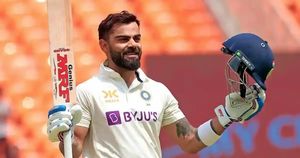Alan Mozo's career at Club Deportivo Guadalajara (Chivas) took another remarkable turn as he celebrated the milestone of playing 100 official matches for the club on February 20, 2025. Renowned for his charisma and professionalism, Mozo has become one of the most beloved players among Chivas fans. His contributions to the team have been significant, making his recent betting controversies even more troubling for supporters.
Since joining Chivas for the Apertura 2022, Mozo has established himself as one of the standout players on the team. Over six tournaments, he has played 93 Liga MX matches, along with three appearances in the CONCACAF Champions Cup and four matches in the Leagues Cup. His totals reflect not only his skill but his relentless energy—traits the fans have come to admire.
Statistically, Mozo's impact is impressive. He has amassed 7,491 minutes of playtime, scored four goals, and provided seven assists during his tenure. Notably, he has been the defender with the most successful defensive actions, winning 99 duels over the last four tournaments and racking up 247 clearances over two years. His agility and crossing ability—averaging 4.31 crosses per game—further distinguish him among his peers.
Despite the excitement over his achievements, Alan Mozo's career has recently come under scrutiny due to allegations of involvement in betting controversies. These incidents strike hard, particularly as they arrive amid celebrations of his successes and growing fan adulation. The duality of his situation raises questions: Can one misstep overshadow remarkable talent?
Fans remembering the recently celebrated performances also grapple with unease as the story around Mozo develops. Chivas fans have long supported their players through thick and thin, and Mozo's skill on the pitch has certainly earned him their loyalty. But with the betting allegations gaining traction, the future appears murkier.
Supporters are rallying for Mozo, asserting his importance to the team and hoping it will shield him from the storms brewing outside the stadium. They view him as more than just statistics or headlines; to them, he embodies the spirit of Chivas—resilient and committed. Nevertheless, the realities of modern sports demand accountability and integrity, prompting demands for transparency from both Mozo and the club's management.
Chivas finds itself at the crossroads of supporting its players during personal turmoil and maintaining its reputation as one of Mexico's most revered football institutions. Investigations are necessary; whether they yield ramifications for Mozo remains to be seen.
Questions linger: Will this controversy overshadow his milestone and cloud the achievements he has worked tirelessly to build? Have the fans' emotions, the pride surrounding his contributions, and the unfortunate allegations converged at the point where they can no longer coexist peacefully?
Until definite conclusions are drawn, Alan Mozo's unique legacy as one of Chivas' finest defenders is contrasted with the troubling potential of his actions off the pitch. What was shaped as success is now marred by uncertainty and challenges—an all too common predicament faced by athletes today.
Alan's performance on the field is unmatched, but the revelations off it force directors, fans, and players themselves to reconsider what it means to be part of such a storied franchise. At the heart of these discussions is the potential for growth both as athletes and individuals, navigated through the ups and downs of professional sports.



